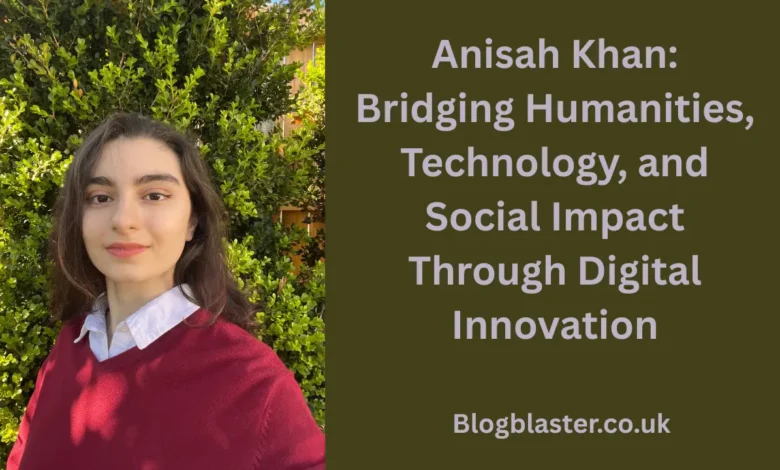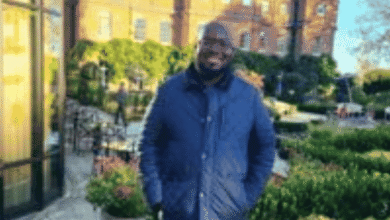Anisah Khan: Bridging Humanities, Technology, and Social Impact Through Digital Innovation

Anisah Khan is an emerging academic voice known for her unique interdisciplinary work that connects English literature, psychology, and digital humanities. As a student and researcher at the University of Houston (UH), she has become a symbol of how the humanities and technology can merge to create socially impactful research. Her intellectual curiosity and personal experiences have shaped her academic pursuits — from analyzing South Asian narratives of displacement to digitizing educational resources that bridge the gap between art and medicine. Anisah Khan’s story reflects the growing role of digital humanities in understanding modern identity, accessibility, and storytelling.
Early Life and Educational Background of Anisah Khan
While detailed biographical information about Anisah Khan remains limited, what is clear is her profound commitment to education and research. She pursued her bachelor’s degree in English at the University of Houston, complemented by minors in Psychology and Laws, Values, & Policy.
Her academic path demonstrates a multidimensional approach — one that doesn’t see humanities, science, or technology as separate domains but as interconnected tools for insight and social change.
Growing up bilingual, Anisah Khan was fluent in Urdu as a child but gradually lost fluency after beginning formal education in English. This personal experience would later inspire her research interest in language loss among immigrant families and the preservation of cultural identity through storytelling.
Anisah Khan and the Digital Humanities Core Facility (DHCF)
One of Anisah Khan’s most defining academic roles is her work with the Digital Humanities Core Facility (DHCF) at the University of Houston. The DHCF serves as a hub for innovative digital research, providing resources to students and faculty exploring intersections between technology, culture, and information science.
As a Digital Research Specialist, Anisah Khan contributed to projects that blend data analysis, creative writing, and visualization tools. Her work particularly focused on making academic research more accessible, interactive, and community-driven.
She often describes digital humanities as a space where material meets processing and presentation — transforming raw data into something both analytical and visually engaging. This philosophy underlines her commitment to bringing academic content to broader audiences.
The Innovations in Art and Health Project
One of Anisah Khan’s most notable achievements at UH is her work on the project Innovations in Art and Health.
This interdisciplinary initiative combines essays and research from medical professionals, artists, and scholars to explore how creativity and medicine intersect. Anisah Khan served as the Production Editor, playing a key role in transforming the collection into a digital, interactive textbook using Pressbooks, an open-source publishing platform.
Through her editorial and design expertise, she ensured that the digital book was not only educational but also engaging — incorporating accessible visuals, intuitive navigation, and inclusive design principles. Her work illustrates how digital publishing can make complex academic subjects easier to grasp for students, practitioners, and the public alike.
Academic Interests and Research Focus
Anisah Khan’s research interests reflect her diverse educational background and personal life experiences. Some of her most prominent areas of exploration include:
Partition Literature and South Asian Narratives
Her senior thesis investigates how first-generation South Asian authors depict experiences of migration, memory, and the Partition of India, as well as how second-generation writers reinterpret those memories.
By studying intergenerational storytelling, Anisah Khan sheds light on the evolving relationship between trauma, cultural identity, and diaspora literature. Her work helps preserve historical and emotional narratives that might otherwise fade across generations.
Language Preservation and Cultural Identity
Growing up in a bilingual household, she experienced firsthand how assimilation into Western education systems can lead to the erosion of native language fluency. This personal journey inspired her to explore how immigrant families navigate identity through language retention or loss.
Her research in this area aligns with wider cultural studies on linguistic heritage and multilingual storytelling, bridging academic theory with lived experience.
Disability Advocacy and Accessibility
Anisah Khan’s passion for accessibility is deeply personal. Her younger brother was diagnosed with autism at age three, and witnessing his educational challenges motivated her to advocate for more inclusive learning environments.
This advocacy informs her academic work — emphasizing that technology and storytelling must remain accessible to all users, including those with disabilities. Her involvement in digital humanities demonstrates how inclusivity can be built directly into the design and presentation of knowledge.
The Future of Digital Humanities
Anisah Khan represents a new generation of scholars who are redefining the boundaries of academia. She views digital humanities as a collaborative ecosystem, merging coding, literature, policy, and psychology to create tangible change.
Her work encourages students and researchers to see the humanities not as abstract or theoretical but as a dynamic field empowered by digital tools like Google Colab, OCR (Optical Character Recognition), and online publishing platforms.
Bridging STEM and Humanities
A recurring theme in Anisah Khan’s philosophy is the dismantling of the artificial divide between STEM and the humanities. She believes that real-world progress occurs when scientific thinking and creative expression work hand in hand.
Projects like Innovations in Art and Health exemplify this approach. By bringing together medical professionals and artists, Anisah Khan shows that storytelling and data visualization are essential for communicating scientific ideas and fostering empathy.
In interviews, she emphasizes that digital tools empower humanities researchers to share their findings with clarity and creativity — proving that literature, psychology, and data science can coexist harmoniously.
Empowering First-Generation Voices
As a first-generation university student and researcher, Anisah Khan’s work also centers on the representation of immigrant and minority voices in academia.
Her research into Partition literature reflects a broader mission — to make academic spaces more inclusive of marginalized histories and perspectives. Through digital humanities, she amplifies stories that often go unheard, giving new life to cultural memory through technology.
In doing so, she serves as an inspiration to other young scholars from diverse backgrounds who wish to blend personal experience with academic innovation.
The Personal Motivation Behind Anisah Khan’s Work
Beyond her impressive academic résumé, what truly defines Anisah Khan is her deep sense of empathy and social purpose. Her passion for storytelling, disability advocacy, and language preservation all stem from her own lived experiences.
She has spoken openly about the ways her brother’s autism shaped her worldview — pushing her to think about how systems of education, policy, and culture include (or exclude) individuals with disabilities.
Likewise, her connection to Urdu and the South Asian diaspora reflects a desire to preserve and celebrate cultural roots in a world that often prioritizes assimilation. Her ability to intertwine these personal insights with academic rigor makes her research authentic, relatable, and impactful.
Tools and Techniques Used by Anisah Khan
Anisah Khan is not only a writer and researcher but also a skilled digital content creator. Her projects often incorporate technical platforms and analytical tools such as:
- Google Colab – for data organization and collaboration
- OCR (Optical Character Recognition) – for digitizing historical texts and archival material
- Pressbooks – for creating open-access, interactive textbooks
- Visualization software – to transform qualitative data into accessible digital displays
Through these tools, she demonstrates that digital literacy is an essential skill for modern humanities scholars. Her approach blends traditional analysis with cutting-edge presentation methods, expanding what academic research can look like in the 21st century.
Recognition and Impact
Although early in her career, Anisah Khan’s work has already gained recognition within her academic community. Her participation in the DHCF and her contributions to “Innovations in Art and Health” have been featured by the University of Houston’s Research News.
Her growing visibility in digital humanities circles signals a promising academic future — one in which young scholars use technology to make knowledge more democratic and inclusive.
By combining accessibility with storytelling, she’s helping reshape how academic projects engage with audiences beyond university walls.
Anisah Khan’s Vision for the Future
Looking ahead, Anisah Khan envisions a world where research, creativity, and social advocacy intersect seamlessly. She encourages future researchers to approach their work not as isolated specialists but as storytellers, designers, and collaborators.
Her long-term goals likely include further exploration of digital pedagogy, multilingual education, and inclusive publishing, building on her foundation in both humanities and policy studies.
As the world increasingly depends on digital communication, scholars like Anisah Khan are leading the way in making knowledge open, interactive, and human-centered.
Why Anisah Khan Matters in 2025 and Beyond
The significance of Anisah Khan’s work extends far beyond her university campus. Her interdisciplinary approach embodies key trends shaping global academia:
- Digital transformation of traditional research
- Cross-disciplinary collaboration between technology, art, and science
- Equitable access to information
- Representation of marginalized narratives in digital spaces
Her research contributes to broader conversations about decolonizing education, empowering immigrant voices, and integrating empathy into data-driven fields.
As universities and institutions continue to evolve, figures like Anisah Khan will play a crucial role in ensuring that technology serves people — not the other way around.
Conclusion: The Legacy of Anisah Khan’s Work
Anisah Khan represents a new generation of thinkers who are reshaping the academic landscape. Her journey through English literature, digital humanities, and social advocacy illustrates how powerful research becomes when it’s both personal and purposeful.
You May Also Read: Fiona Peet: A Rising Legal and Media Professional with a Global Outlook




